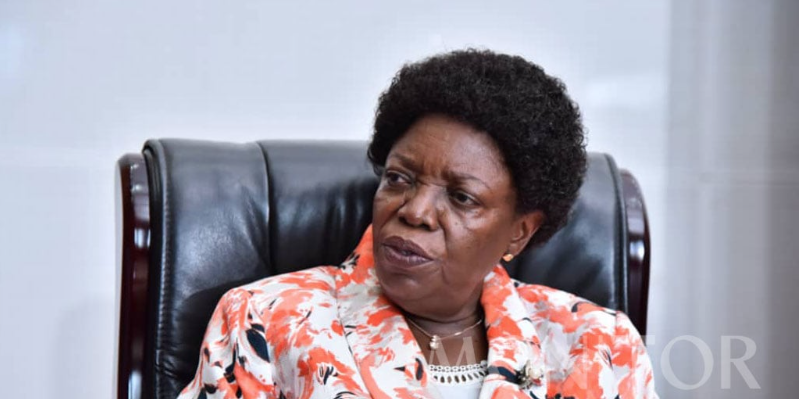Prime
NCHE agrees to drop ‘expired’ course label

Graduates of Bachelor of Medicine and Bachelor of Surgery during the 73rd graduation ceremony at Makerere University, Kampala, on February 13. The National Council for Higher Education has agreed to scrap the use of the word “expired” in categorisation of academic programmes at universities and tertiary institutions. PHOTO | FRANK BAGUMA
What you need to know:
- The executive heads of universities met with NHCE counterparts on June 1 and, among others, proposed that programmes be reviewed every after three graduation cycles, according to Prof George Ladaah Openjuru, the chairman of Uganda Vice Chancellors’ Forum.
The National Council for Higher Education (NCHE) has agreed to scrap the use of the word “expired” in categorisation of academic programmes at universities and tertiary institutions pending review, ending weeks of national anxiety.
The entity’s 20-member Council chaired by Prof Eli Katunguka, the vice chancellor of Kyambogo University, reportedly reached the decision during a meeting yesterday that ended at about 7:30pm.
“We have replaced the word ‘expired’ with a suitable word, but we were not conclusive on the timeframe when an accredited programme should be re-assessed,” one official who attended the meeting said.
The source declined to be named for lack of authority to speak on the matter and was unwilling to discuss specifics of other recommendations, saying the higher education regulator is to provide details at a press conference today.
It remained unclear whether the Council, which provides policy oversight over NCHE secretariat, agreed to rename academic programmes whose status is under consideration “due for review”, rather than “expired”, as suggested by vice chancellors.
The executive heads of universities met with NHCE counterparts on June 1 and, among others, proposed that programmes be reviewed every after three graduation cycles, according to Prof George Ladaah Openjuru, the chairman of Uganda Vice Chancellors’ Forum.
This would mean a three-year programme should at the earliest be reviewed after nine years while it would take 15 years before a five-year academic programme isreconsidered.
Prof Openjuru said last night that their proposal was informed by the possibility that pioneer cohorts would have graduated and worked for at least three years, the second cohort would have two-year work experience while the third would be a year into testing their skills in the world of work.
“That is when they (programme alumni) can give feedback [on the practical application of their scholarly skills]. That is when the industry (employers) can give also an informed feedback [on suitability of the working graduates] during tracer studies,” he said by telephone.
The country was thrown into panic last month, and graduates questioned the credibility of their academic documents, after the University of Bristol in the United Kingdom and other universities in Europe and the United States bounced some Ugandan graduate applicants on grounds that their first degrees were in programmes listed as “expired” on NCHE website.
Programmes christened as such gross 2,000, according to our count, affecting universities, national teachers’ colleges and other diploma and certificate-awarding institutions.
The wide-ranging impact of the nomenclature prompted Parliament to constitute a committee to inquire into the matter while guild presidents from various universities gave NCHE and administrators at their universities a two-week ultimatum to resolve the crisis.
Some institutions, among them Uganda Christian University and Victoria University, in statements said they were teaching no “expired” programmes and some of the courses listed against them had either never existed, been merged or restructured.
In order to end officials talking at cross-purposes on a sensitive matter that touched on almost all Ugandan families, Higher Education State Minister Dr Chrysostom Muyingo ordered NCHE honchos and universities vice chancellors to meet and urgently resolve what insiders called differences of opinion.
“I think it was a small mix-up,” said Prof Openjuru, the vice chancellor of Gulu University, adding that the mislabeling of the programmes by NCHE did not affect the validity of any academic awards.
On his part, Uganda Technology and Management University (Utamu) Vice Chancellor, Prof Eddy Tukamushaba, said: “We agreed that the word ‘expired’ was used in error and it should be dropped because it is fooling the public”.
In the regulator’s parlance, the usage of the word “expired” denotes a programme that has exceeded the timeframe for its teaching from time of accreditation, one that has been restructured, merged to create a new one or phased out.
“If a programme is accredited, it cannot expire, but it can be reviewed,” noted Prof Tukamushabe.
Academic programmes across universities globally are reviewed regularly to incorporate new knowledge, adapt to technological changes that may alter teaching and learning or make adjustments to accommodate feedback by programme alumni and employers on skilling suitability in the world of work.
Officials at the June 1 meeting found out that majority universities only engage NCHE during maiden accreditation of a programme, and rarely file reports on restructured or phased out programmes, which remain existing in the regulator’s records.
To bridge the divide, it was resolved that NCHE sets up a platform that sends automated alerts to remind universities and tertiary institution whenever academic programmes are due for review in order to prevent inordinate reconsideration delays.
Prof Ismail Gyagenda, the vice chancellor of the Islamic University in Uganda (IUIU), declined to discuss the matter and asked our journalists to wait for today’s press conference.
Asked about the decisions Council members reached yesterday, NCHE Executive Director Prof Mary Okwakol said “decisions were made and we shall give you information tomorrow (today) … be patient”.
Staff of the regulator are to visit UCU in coming days, the institution’s spokesman Jimmy Siasa said, to inspect facilities there to determine the university’s continued eligibility to run all accredited academic programmes or those under review.




